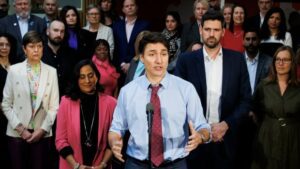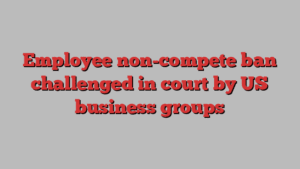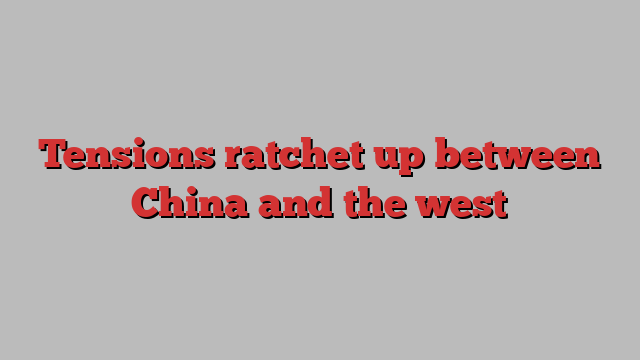
This article is an onsite version of our Disrupted Times newsletter. Subscribers can sign up here to get the newsletter delivered three times a week. Explore all of our newsletters here
Today’s top stories
US President Joe Biden signed a highly anticipated $95bn foreign aid bill, triggering a move to rush $1bn in new weapons to Kyiv from US stockpiles, including much-needed air defence interceptors and artillery rounds.
Israel began preparations to evacuate civilians from Rafah, ahead of a long-expected assault on Hamas’s remaining forces in the southern Gazan city.
The European parliament voted for the EU to leave an international treaty that is seen by campaigners as protecting fossil fuel investments. Several EU governments are being sued by fossil fuel majors under the treaty for putting in place green legislation that they say undermines their investments.
For up-to-the-minute news updates, visit our live blog
Good evening.
EU raids on a Chinese security equipment supplier and a new probe into China’s medical market have become the latest flashpoints in tensions between Brussels and Beijing, while the US Congress has approved a ban on TikTok, the Chinese-owned video sharing platform.
Brussels this morning used new anti-foreign subsidy rules for the first time to pounce on the Polish and Dutch offices of Nuctech, which makes baggage security scanners. The Chinese chamber of commerce hit back, saying the move “undermines the business environment for foreign companies within the EU in the disguise of foreign subsidies”.
The relationship between China and Europe is already under strain after a spate of arrests in Germany of people suspected of trying to sell sensitive military tech to Beijing, one of them a staffer in the European parliament of the far-right AfD.
The arrests came just days after German Chancellor Olaf Scholz returned from a state visit to China, his country’s biggest trading partner. During the visit, Chinese President Xi Jinping warned against growing protectionism and kicked back against accusations of industrial overcapacity, especially in electric vehicle and renewable energy sectors, where his country has been accused of planning to dump cheap goods in EU markets, a concern echoed in Washington.
The EU investigation into China’s medical device market argues European manufacturers are being unfairly blocked from supplying doctors and hospitals and is the first use of a new international procurement instrument.
Relations between Beijing and Washington are also being tested, most recently by the TikTok saga. The US Senate yesterday approved a bill banning the video-sharing platform unless its Chinese owner ByteDance divested it. (You can catch up on that debate with our new explainer).
Separately yesterday, the American Chamber of Commerce in China hit out at Beijing for policy inconsistencies that were putting off foreign investors, despite Xi’s recent attempts to woo US businesses. It highlighted “stringent data control policies”, “raids on consultancies”, “closure of databases” and “concerns over the ambiguity of newly enacted and enforced national security, data security and counter-espionage laws and regulations”.
The Chinese foreign ministry said the complaints represented “the malicious intention of curbing and suppressing China’s industrial development”.
Sean Stein, AmCham China chair, acknowledged that developments in US politics were also creating “greater complexity” for American companies in China. “The end result is companies are getting squeezed between the two governments,” he said.
Need to know: UK and Europe economy
The UK is also increasing aid for Kyiv, as well as lifting overall defence spending to 2.5 per cent of gross domestic product by the end of the decade.
UK business activity was better than expected in April, according to new S&P Global PMI data, expanding at the fastest rate since May. There was also good news on food prices as grocery inflation hit a 30-month low of 3.2 per cent, fuelled by a big jump in promotional spending by retailers.
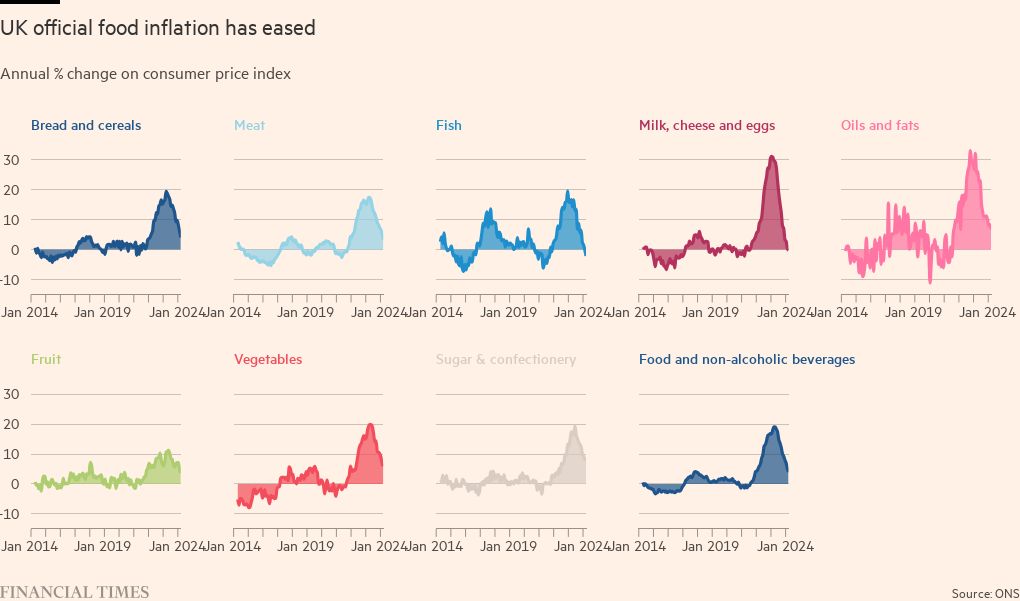
Less promisingly, official data has shown the UK is borrowing more than expected, dealing a blow to hopes of tax cuts, while expectations of an interest rate cut were dented by a decidedly cautious Bank of England chief economist Huw Pill.
Rising mortgage rates have been the dominant feature of the UK property market and a big contributor to the housing crisis. Could long-term mortgages with rates fixed for a decade or more be the answer? A Big Read investigates.
In the eurozone, the PMI survey showed business activity also hit an 11-month high, while business confidence in Germany, the bloc’s biggest economy, was at its strongest since last May, according to the closely watched Ifo survey. The German government also upgraded its growth forecasts.
A Russian court ordered the seizure of $440mn from JPMorgan Chase after state-owned lender VTB filed a lawsuit to “recover losses” from the largest US bank. The funds are in accounts frozen after Russia’s full-scale invasion of Ukraine. European companies still operating in Russia are racing to comply with a new EU sanctions provision that could significantly alter the way they do business in the country.
Mediterranean container ports are at full capacity, raising the risk of higher inventory costs and component shortages for Europe’s retailers and manufacturers in the latest challenge to the region’s supply chains.
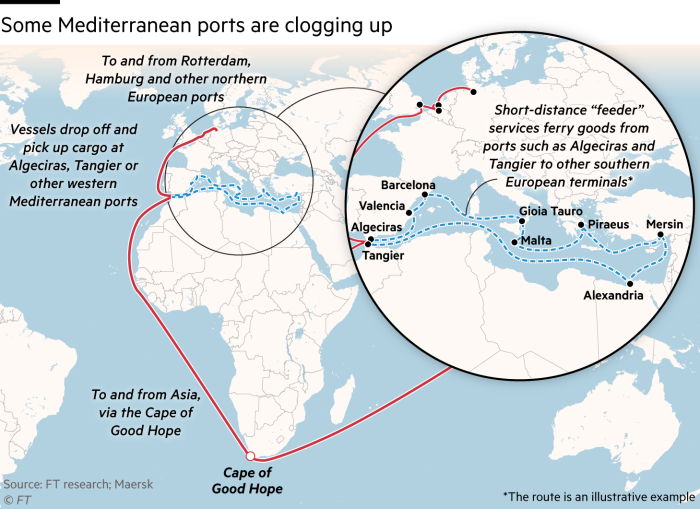
Need to know: Global economy
While most investors are expecting US interest rates to be cut, some are now pricing in the possibility of an increase, prompting the FT editorial board to caution: “Interest rate narratives have switched once; they could switch again.” JPMorgan Chase chief executive Jamie Dimon said the US economy was “booming” but remained cautious on the prospects of a soft landing.
Thirty years after the end of white minority rule and weeks before an election, some young South Africans are questioning the role of the ruling ANC and the legacy of Nelson Mandela. A Big Read explains.
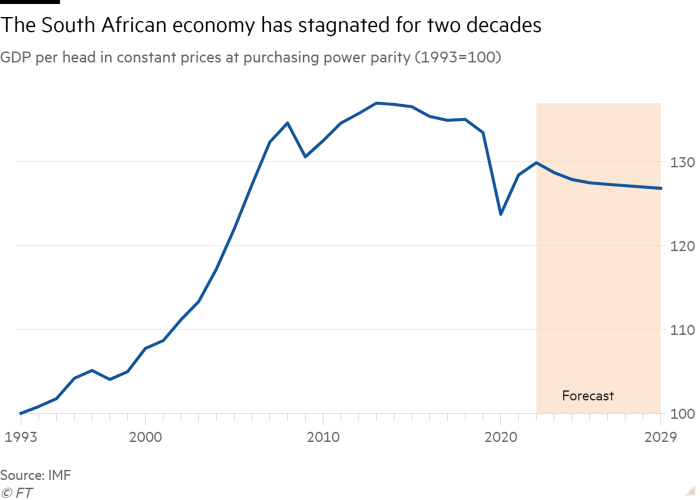
India is seeking to shore up its access to critical minerals such as lithium as it tries to catch up with rivals in the race to build next-generation energy supply chains. New Delhi is pushing state-owned mining groups to pursue mineral reserves in South America and Africa as well as inviting bids to develop domestic mining blocks.
Latin American cocoa farmers are rushing to expand planting as the price of chocolate’s main ingredient soars amid a global shortage of supplies, exacerbated by crop disease and poor weather in west Africa.
Need to know: Business
US plane maker Boeing burnt through almost $4bn in the first quarter, reflecting slower 737 Max production and compensation to customers in the aftermath of a mid-air door blowout in January.
The UK competition regulator took the first steps towards new probes into AI deals from Microsoft and Amazon. Concerns have grown that Big Tech may be taking advantage of AI companies’ need for computing power by luring cash-strapped start-ups to their cloud services in exchange for a stake.
Tesla’s plan to bring forward the launch of more affordable models lifted the electric car company’s shares despite reporting a decline in quarterly sales. The International Energy Agency countered some of the gloom in the industry (see Monday’s DT) by arguing EV sales would “grow strongly” this year, with battery and hybrid models accounting for one in five cars sold worldwide.
Spotify hit a record quarterly profit of €197mn as the music streaming pioneer entered what chief executive Daniel Ek called a “new phase”. The company has been raising prices for consumers while cutting back spending.
London’s Heathrow airport said the summer season was likely to be the busiest on record and that 82.4mn passengers would travel through the hub this year.
Cyber attackers are experimenting with new ransomware on businesses in Africa, Asia and South America, before targeting higher-value companies in the West, according to a new report.
UK media executives and artists called on the next government for urgent investment or risk the country’s reputation as a creative industries “superpower”.
The World of Work
UK retail bellwether John Lewis said it would publish job interview questions online to make the process less daunting for applicants. Many employers are struggling to find the right staff in a tight labour market: according to recruiter Manpower, eight in 10 UK businesses faced talent shortages this year.
KPMG has revoked job offers to some foreign graduates in the UK after the government tightened visa rules for overseas workers as it attempts to cut record immigration.
How important is loyalty in the workplace? Is it more than just a sure-fire way to becoming underpaid and underpromoted? Listen to the new Working It podcast.
Some good news
Tomorrow is World Malaria Day. Despite an uptick in global cases there are some encouraging developments: new state-of-the art mosquito nets have prevented an estimated 13mn cases in Sub-Saharan Africa.
Recommended newsletters
Working it — Discover the big ideas shaping today’s workplaces with a weekly newsletter from work & careers editor Isabel Berwick. Sign up here
The Climate Graphic: Explained — Understanding the most important climate data of the week. Sign up here
Thanks for reading Disrupted Times. If this newsletter has been forwarded to you, please sign up here to receive future issues. And please share your feedback with us at [email protected]. Thank you
